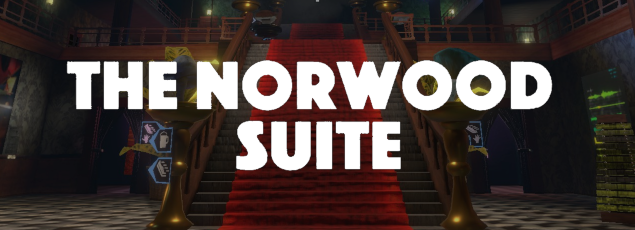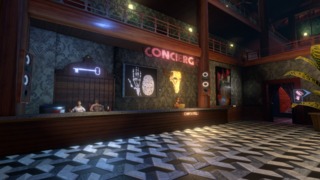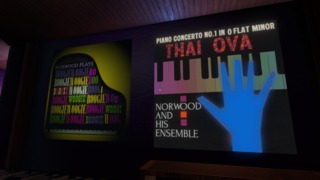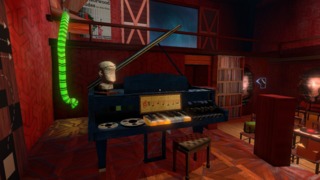Reservations: Music in The Norwood Suite
By gamer_152 3 Comments
Note: The following article contains major spoilers for The Norwood Suite and minor spoilers for Off-Peak.

I think of The Norwood Suite very differently now than when I first played it. A 2017 narrative adventure game by Cosmo D, The Norwood Suite is an outgrowth of his previous project, Off-Peak. Off-Peak's setting is officially a train station, but in practice, it's a gallery of hallucinogenic art unbound by medium. Its collection ranges from giant mushroom sculptures to Polish pop posters, from the covers of sheet music to trays of cookies. As I settled myself in The Norwood Suite, I thought of the adventure title as trying to transpose that absurdity and unpredictability into a functional space.

The game's single mega-level, the Norwood Hotel, has skulls in its fridges, levers shaped like human hands, and is fronted by a miniature Mount Rushmore with flood-light eyes. But in comparison to Off-Peak, there are more rooms modelled after places you'd encounter in the real world, and characters more commonly use rooms for their intended purpose. There's a quest to retrieve a book from the library, you make a sandwich in the kitchen, there's a man off the clock swimming in the pool, etc. The Norwood Suite employs the classic technique of juxtaposing the quotidian and surreal to make the strange seem all the stranger. You'll be walking along a roughly believable hotel hallway, squeak open a door, and see office blocks inside bouncing like jelly to an EDM floor filler.
This entry in the Off-Peakverse also shrinks the series' vision cone down until it includes just one medium. Cosmo's previous project was this carnival of paintings, sculptures, music, board games, food, everything under the sun. The Norwood Suite uses Off-Peak's disproportionate, goofy style, but its theme is music exclusively. It's ruminating on the duel for respect between the dusty but dignified musical old guard and the young, euphoric soundmakers nipping at their heels. The floorboards of the hotel bow under the accumulated history of the classical composition represented within, but in the basement, making itself heard loud, if a little muffled, are the underground rumblings of DJ Bogart. All of that is true of The Norwood Suite. Yet, after finishing it, I realised it's also true that the game is about people arranging themselves to find some comfortable position in the music community and wondering if that's even possible. It's about loving your instrument but being dissatisfied with the industry it serves and hesitating about continuing to play. It's about what it takes to be a star and who gets to be one.

The Norwood Hotel is famed for the long-time residence of genre-blazing composer Peter Norwood who mysteriously vanished one night years before your arrival. Your mission is to enter the rave under the establishment. To pass the bouncer, you need to put together one of Peter Norwood's aristocratic yet trashy ensembles, including a mask modelled on the musician. To get your foot on the ladder of music, you must act a part and conform to a singular vision of what a musician looks like instead of being yourself. The blossoming artist needs to get their image out there, but the question arises of how they're meant to do that when they're expected to wear someone else's face.
To build your outfit in the game, you must enter the composer's eponymous suite, which is easier said than done when the reverence for Norwood borders on the cultish. Talking to the staff and guests of the hotel, it becomes clear that the influence of Norwood is so pervasive that he can never be shut out of the musical conversation. Everywhere you go in the building, there are huge portraits and dioramas of the man, a volume of his etudes sits under museum glass, and the receptionists consider the Norwood Suite strictly off-limits. You have to play one of Norwood's motifs on a piano to open up a staircase to his roost in the attic.

The message is that the music industry is rigid and impenetrable, and it's intimidating to live up to the stature of a Mozart or Miles Davis type. Judging by the size of Norwood's footwear in his potraits, we literally have big shoes to fill. A woman in the hotel bar also struggles with the previous generations' expectations. While she tries to bring home the bacon by spinning ad jingles, her father insists she should be composing for a more grandiose purpose and chides her for writing with a computer instead of pen and paper. The game also asks whether Norwood should occupy the entire acoustic bandwidth when he's someone who hasn't been active in the scene for years. In the twist ending, we learn that an infirm and silent man we earlier saw hooked up to hospital equipment is Peter Norwood. There's a lot of fun to be had wallowing in the fandom of this guy who dresses like a kid's imaginary friend and writes piano and saxophone music inspired by turtles. But he's not speaking anything new into the world; he's kept alive on life support.
We get most of the clothing that we need to reach the ending from fetch quests that unlock secret passages in the hotel. Invading music's inner sanctum is a little about playing instruments or producing but mostly about making connections. It's a dance we can see other people in the business performing. DJ Bogart and a nameless band member both stand to be airlifted to greater things by a sponsorship from Blue Moose (a Red Bull parody). Bogart manages a Houdini-like escape from his agreement with the hotel by exploiting a loophole in it, while a Blue Moose rep encourages an up-and-coming rocker to ditch his bandmates in the pursuit of solo recognition. There's no logic in success in the industry relying on companies that have nothing to do with the medium, like energy drink manufacturers, but it does so anyway.

In the darkly comic final scene, DJ Bogart is revealed to be a robot before Norwood shambles zombie-like towards us. Even if Norwood's heyday is long behind him and there are new kids on the block, music as a profession is still about the powerful puppeteering the talent. Yet, like us, a person exploring the hotel's secret passages, the social climbers find sneaky back routes through music's halls. In the Norwood Suite, there is a mannequin: A humanoid blank slate that we could clothe any which way, but we are forced to dress it as Norwood. This is the outfit we will soon change into. As we fill in the missing vestments and the dioramas in the hotel fill in our knowledge of the composer, Peter Norwood slowly takes shape in front of us. Not Peter Norwood the myth, but Peter Norwood, the man. We naturally question whether we want to become that mannequin: a soulless outline of a person wearing a celebrity costume.
Behind the scenes, the tableaus of Norwood's musical escapades can be whimsical and larger-than-life. However, they combine with the gossip around the hotel to communicate that Norwood could be aggressive towards his collaborators, collaborators who remain nameless while the composer has become legend. There are also rumours wafting through the hotel that he took credit for other peoples' work. In Peter's abandoned bedroom, old letters from colleagues evidence the relationships that he frayed over the years. A sign above that book of Norwood's sheet music warns that playing it could be dangerous, and a man who performs it injures his hands. It's symbolic of the professional and emotional hazards of the music business, but also the physical strain that the repetitive movements of playing an instrument can put on the body. A music teacher in the hall finds her own frustrations, fruitlessly trying to pique her students' interests in the context of Norwood's compositions and not just the recordings themselves.

As funny and curious as The Norwood Suite is, its melancholy cuts to the bone. When you discover its chiming bowling pins, stave wallpaper, and search for a long-lost record, you get to share in its characters' infectious reverence for music. But the baggage of the music business has left those same characters weary. The Norwood Suite laments the possibility that you can dedicate years, even decades, of your life to a practice you love, only to realise that before you is a thicket of unfair expectations, shady contract law, personal sacrifice, and workplace abuse. Do you endure all that, or do you leave it all behind and disappear into the walls like Peter Norwood? In taking either option, you leave a little piece of yourself behind. Thanks for reading.